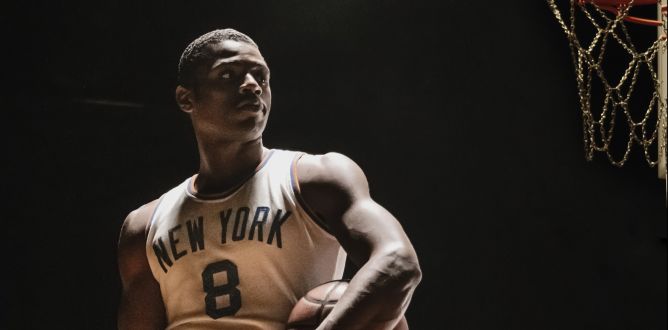Sweetwater Parent Guide
This movie isn't a dazzling slam dunk but it tells an important story and does it well.
Parent Movie Review
In the 1940’s, professional basketball is a white man’s game. So, the only way a man of color can earn money playing basketball is if he is good enough to be part of the Harlem Globetrotters. And even that isn’t as glamorous as it sounds. Created by shrewd businessman Abe Saperstein (Kevin Pollak), the Trotters are a group of talented athletes who “entertain” on the court more than they play the game. Most of their venues are as small as their pay. Travel and accommodations usually happen in the team’s aging bus because money is tight, and Black guests aren’t welcome in many hotels.
Prospects look fairer after the Trotters are invited to Madison Square Gardens to play against the Minneapolis Lakers. Displaying their best “razzle-dazzle”, the all-black team beats the National Basketball Association’s reigning champions, packs the house with enthusiastic fans, and captures the attention of the NBA board.
Of particular interest is the star of the Globetrotters, Nat “Sweetwater” Clifton (Everett Osborne), a giant in size and skill. Joe Lapchick (Jeremy Piven), coach of the New York Knickerbockers, is convinced Sweetwater could make their team winners, both in the sport and in social change. However, he faces major opposition from Knicks’ owner Ned Irish (Cary Elwes), the other teams in the league, and NBA president Maurice Podoloff (Richard Dreyfuss).
Based on a true story, the movie follows a familiar playbook as it explores prejudice in the world of basketball. Sweetwater, and those who advocate for his entry into professional sports, face verbal and physical threats (a couple of altercations are shown with minimal violence). Black athletes are the victims of discrimination by referees, employers, and members of the public. As well, the film makes note of the prejudice that delays recognition of Black contributions: Nathaniel “Sweetwater” Clifton wasn’t inducted into the Naismith Memorial Basketball Hall of Fame until 2014.
Although the script isn’t particularly novel in its approach, it does tell a story we still need to hear. Just as basketball is no longer an all-white sport, we too can learn from the past and make a future with more fairness and inclusivity.
Directed by Martin Guigui. Starring Cary Elwes, Eric Roberts, Everett Osborne. Running time: 114 minutes. Theatrical release April 14, 2023. Updated January 11, 2024Watch the trailer for Sweetwater
Sweetwater
Rating & Content Info
Why is Sweetwater rated PG-13? Sweetwater is rated PG-13 by the MPAA for some racial slurs, violence and smoking.
Violence: Characters experience racial prejudice: They are turned away from restaurants and hotels, treated unfairly by referees, as well as threated verbally and physically. A white character points a rifle at a black man. A character punches a man in self-defense after narrowly escaping being beaten with a metal pipe. Characters sympathetic to Black Americans are also physically beaten and verbally threatened.
Sexual Content: None noted.
Profanity: Infrequent racial slurs are heard. The script includes some mild and moderate profanity.
Alcohol / Drug Use: Characters are frequently seen smoking. Social drinking is infrequently depicted in nightclubs and boardrooms.
Page last updated January 11, 2024
Sweetwater Parents' Guide
Learn more about the real Nat “Sweetwater” Clifton, and coach Joe Lapchick.
In the movie, Nathaniel Clifton’s mother tells her son to “make good use of the hands God gifted” to him. How does the movie remind us of that conversation throughout its depiction of Sweetwater’s life? In what ways does Sweetwater honor her request?
When Joe faces serious opposition as he tries to “break through” the color barrier, his wife advises him to “climb over” instead. How could you apply her wise words to your own challenges?
How does this script try to broaden its message about discrimination when it points out Abe Saperstein is Jewish? What do we learn about prejudice when the white character Jeanne Staples (Emmaline) shows interest in a black jazz band?
What do we learn about the Globetrotters when Abe refers to their clothing as “costumes’ instead of “uniforms”? Why do you think the African American players on the team wanted to prove they were serious athletes? Learn more about Abe Saperstein, and the history of the Harlem Globetrotters.
Loved this movie? Try these books…
For more information about Nathaniel Clifton, you can read the biography Sweetwater by Foster Frank.
The desegregation of the National Basketball Association was a critical part of Ray Scott’s life. Writing with Charley Rosen, he tells his story in The NBA in Black and White: The Memoir of a Trailblazing NBA Player and Coach. David Shields explores racism in the sport in detail in his book Black Planet: Facing Race During an NBA Season. The impact of Black players on professional basketball is analyzed in Black Ball by Theresa Runstedtler.
Home Video
Related home video titles:
Another coach looks for great athletes amongst the African American population in Glory Road.
Other hoopsters hope to better their futures by playing the game in Coach Carter.

